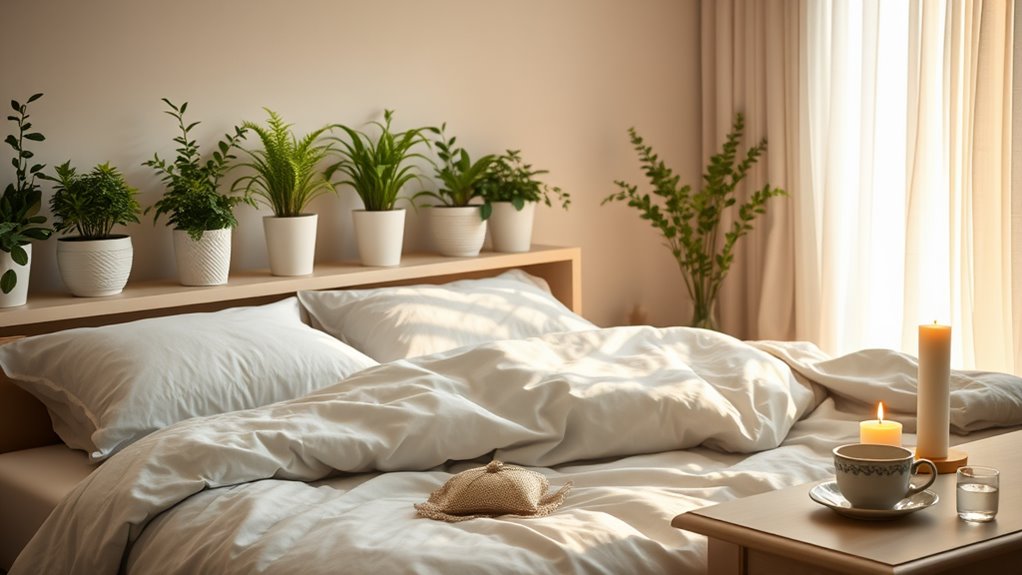Sleep Like a Baby With These Natural Tricks
You can finally catch those elusive Z’s and sleep like a baby by using these simple, natural tricks. Start by creating a calming bedtime routine and sticking to a consistent sleep schedule—your body loves routine! Make your sleep environment comfy—dim the lights, cool down the room, and keep it quiet. Try herbal tea, like chamomile, or lavender scents to soothe you. Don’t forget to limit screen time before bed to avoid those pesky blue lights. Add some deep breathing or mindfulness exercises, and you’ll find it easier to drift off. Stick around, and you might discover even more fantastic tips!
Create a Relaxing Bedtime Routine
A calming bedtime routine sets the stage for a good night’s sleep. Think of it as your nightly ritual, where you unwind and prepare your mind and body for rest.
Start by choosing a consistent bedtime. Your body loves routine, and going to bed at the same time each night helps you drift off easier.
Next, consider what helps you relax. Maybe it’s reading a few pages of your favorite book or listening to soothing music. You could even try a gentle stretch or some deep breathing exercises. These activities signal your brain that it’s time to wind down.
Avoid screens! That bright light from your phone or tablet can trick your brain into thinking it’s still daytime. Instead, dim the lights and create a cozy atmosphere.
Don’t forget about comfort! Snuggling up in your favorite pajamas can make a big difference.
If you have a warm drink—like herbal tea—sipping it while you relax can add a nice touch.
Optimize Your Sleep Environment
To get the most out of your sleep, you need to create an environment that promotes rest. Start by making your bedroom a cozy oasis. Keep the room dark, using blackout curtains or a sleep mask if you need to. Light can mess with your sleep cycle, and we want to keep those pesky sleep disruptors at bay!
Next, think about the temperature. Most people sleep best in a cool room, around 60 to 67 degrees Fahrenheit. So, if you’re sweating like a popsicle left in the sun, it’s time to adjust the thermostat!
Don’t forget about noise. If your neighbor’s dog has a barking contest at night, consider earplugs or a white noise machine. Gentle sounds can help drown out distractions and lull you to sleep.
Finally, declutter your space. A tidy room can help clear your mind. You wouldn’t want to trip over a pile of clothes on your way to dreamland, would you?
Creating a sleep-friendly environment takes a little effort, but the payoff is huge. You’ll be drifting off to dreamland in no time!
Explore Herbal Remedies
If you’re searching for a natural way to catch some Z’s, herbal remedies might be just what you need.
Chamomile tea can help calm your mind, while valerian root might just be the secret weapon against restless nights.
And don’t forget about lavender essential oil—it’s like a spa for your senses, making bedtime feel a little more special!
Chamomile Tea Benefits
Sipping chamomile tea can be a soothing ritual that helps signal your body it’s time to unwind. This delightful herbal brew does more than just taste good; it offers several benefits that can enhance your sleep experience.
Here are four reasons to consider making chamomile tea your go-to nighttime drink:
-
Promotes Relaxation: Chamomile’s natural properties help calm your nerves, making it easier to let go of the day’s stress.
-
Improves Sleep Quality: Many people find that drinking chamomile tea before bed leads to deeper, more restful sleep.
-
Supports Digestion: If you’re feeling a bit bloated or uncomfortable, chamomile can soothe your tummy, allowing you to drift off without those pesky distractions.
-
Rich in Antioxidants: This tea is packed with antioxidants that can help boost your overall health, making you feel better both inside and out.
Valerian Root Effects
Valerian root has gained popularity as a natural remedy for sleep disturbances, and its effects can be quite remarkable. If you’ve ever tossed and turned at night, you might want to give this herb a try. It’s been used for centuries to help people relax and drift off to dreamland. Imagine finally saying goodbye to those restless nights!
When you take valerian root, it works by calming your nervous system. This means you can feel less anxious and more at ease, which is super helpful when you’re trying to sleep. Many people report that they fall asleep faster and enjoy a deeper sleep. How awesome is that?
You can find valerian root in various forms, like teas, capsules, or even tinctures. Just remember, you should start with a small dose and see how your body reacts. Some folks might feel a bit groggy in the morning, so it’s best to test it out on a day when you don’t have big plans!
Lavender Essential Oil
Lavender essential oil is renowned for its calming properties and can be a game-changer in your quest for better sleep. This sweet-smelling oil isn’t just for fancy candles; it’s a natural remedy that can help you unwind and drift off to dreamland.
Here are four easy ways to use lavender essential oil for a peaceful night’s sleep:
-
Diffuser: Add a few drops to a diffuser before bedtime. The gentle aroma fills the room and creates a relaxing atmosphere.
-
Pillow Spray: Mix lavender oil with water in a spray bottle. Give your pillow a spritz before you hit the hay, and let the scent work its magic.
-
Bath Time: Add a few drops to your bath for a soothing soak. It’s like a mini spa in your own home!
-
Massage Oil: Mix lavender oil with a carrier oil and gently massage it on your wrists or neck. You might just feel the stress melt away.
Incorporate Relaxation Techniques
To get better sleep, incorporating relaxation techniques can really help you unwind.
Deep breathing exercises are a simple way to calm your mind, and guided visualization can take you on a relaxing mental journey.
Deep Breathing Exercises
Many people find that deep breathing exercises can significantly enhance relaxation and promote better sleep.
When you focus on your breathing, it helps calm your mind and body. It’s like giving yourself a cozy hug from the inside!
Here are four simple techniques you can try tonight:
-
4-7-8 Breathing: Inhale for 4 seconds, hold for 7 seconds, and exhale for 8 seconds. Repeat this cycle a few times, and feel the tension leave your body.
-
Deep Belly Breathing: Place a hand on your belly. Breathe deeply through your nose, letting your belly rise. Exhale slowly through your mouth, feeling your belly fall. It’s as if you’re blowing up a balloon!
-
Box Breathing: Inhale for 4 seconds, hold for 4 seconds, exhale for 4 seconds, and hold again for 4 seconds. It’s like drawing a box in the air with your breath.
-
Counting Breaths: Count each inhale and exhale up to ten, then start over. This can help clear your mind and keep distractions away.
Try these tonight, and get ready for some sweet dreams!
Guided Visualization Practices
After practicing deep breathing exercises, you might find that guided visualization can further enhance your relaxation and promote restful sleep. Guided visualization is like daydreaming, but with a purpose! You can imagine yourself in a peaceful place, like a sunny beach or a quiet forest, where you feel safe and calm.
To start, find a cozy spot, close your eyes, and take a deep breath. Picture yourself walking along that beach, feeling the warm sand under your feet. Hear the gentle waves and the chirping birds. Let those sounds wash over you, making you feel lighter and more relaxed.
As you visualize, remember to use all your senses. What do you see? What do you smell? Maybe there’s the salty ocean breeze or the sweet scent of flowers. The more details you include, the better!
Keep this peaceful scene in your mind for a few minutes. If distractions creep in, gently guide your thoughts back to your happy place.
With practice, guided visualization can become a lovely bedtime routine, helping you drift off into a restful sleep, feeling refreshed and ready for the next day!
Limit Screen Time Before Bed
Limiting screen time before bed can significantly improve your sleep quality. You mightn’t realize it, but those late-night scrolling sessions can mess with your rest.
The blue light from screens tricks your brain into thinking it’s still daytime, making it harder to wind down. So, why not give your eyes a break? Here are some tips to help you unplug before bedtime:
-
Set a cut-off time**** – Decide on a time, like an hour before bed, to put away all screens.
-
Find alternative activities**** – Pick up a book, doodle, or listen to calming music instead. You’ll be amazed at how relaxing it can be!
-
Create a tech-free zone**** – Keep your bedroom a screen-free sanctuary. No phones or tablets allowed!
-
Use blue light filters – If you must use your devices, try blue light glasses or apps that reduce blue light exposure.
Maintain a Consistent Sleep Schedule
Your body thrives on routine, and maintaining a consistent sleep schedule is one of the best ways to improve your rest.
Think of your sleep like a favorite TV show that comes on at the same time every week. If it’s always there, you know when to tune in! By going to bed and waking up at the same time every day, you help your body know when it’s time to snooze and when it’s time to rise and shine.
This doesn’t mean you can’t enjoy a late-night movie or sleep in on weekends, but try to keep those changes to a minimum. If you go to bed too late or sleep too long, you might feel groggy the next day, like a bear waking up from hibernation!
To make your sleep schedule stick, set a bedtime that’s reasonable for you. Create a calming routine before bed, like reading a book or sipping herbal tea.
Practice Mindfulness and Meditation
Mindfulness and meditation can transform your sleep experience, acting like a soothing lullaby for your mind.
By focusing on the present moment, you can let go of the day’s stress and prepare yourself for a restful night. It’s easier than you might think, and you don’t need a fancy yoga studio to get started.
Here are four simple steps to help you practice mindfulness and meditation before bedtime:
-
Breathe Deeply: Find a comfy spot, close your eyes, and take deep breaths. Inhale through your nose, hold for a moment, then exhale slowly through your mouth.
-
Body Scan: Start at your toes and work your way up. Notice any tension and consciously relax each part of your body.
-
Visualization: Picture a peaceful scene, like a beach or a quiet forest. Imagine the sounds and smells, letting your mind drift away.
-
Gratitude: Before you sleep, think of three things you’re thankful for. It’ll help you end the day on a positive note.





